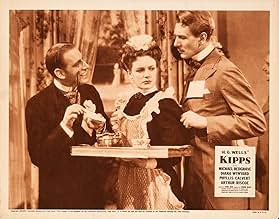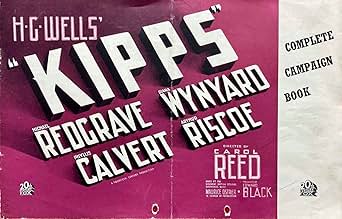Kipps, the draper's apprentice, falls in love with a girl above his station. After he unexpectedly inherits a fortune, he thinks his dream has come true. But money can't make him a gentleman... Read allKipps, the draper's apprentice, falls in love with a girl above his station. After he unexpectedly inherits a fortune, he thinks his dream has come true. But money can't make him a gentleman, or bring him the girl he really wants.Kipps, the draper's apprentice, falls in love with a girl above his station. After he unexpectedly inherits a fortune, he thinks his dream has come true. But money can't make him a gentleman, or bring him the girl he really wants.
- Director
- Writers
- Stars
- Ann Pornick (as a girl)
- (as Diana Caldewood)
- Director
- Writers
- All cast & crew
- Production, box office & more at IMDbPro
Featured reviews
Briefly, Kipps is a young draper's assistant who comes into money the very day he leaves his job. He thinks that the money will solve all his problems, but how wrong he is! And suddenly everyone he meets is either in society or trying to impress, and he is almost forbidden from talking to his old friends. Ann the maid is the only real character in the entire story, the only one who likes just to be herself, in a nice simple house, with a nice homely lifestyle.
This was my 19th Phyllis Calvert film, and I must say I'm very impressed with her cockney accent! I'm hoping that another one might pop up somewhere in what I'm still to see, but I somehow doubt it.
From a novel by (a less than usual subject normally associated with) H G Wells, this enchanting piece of sub Dickensian clash-of-the-classes is rich in period detail, is at times witty but generally unenthralling fluff. Interestingly, directed by one Carol Reed, only 8 years before his mega-classic The Third Man, Kipps looks twenty years older in style - and quality, than his later classic. Whether that was budgetary, or intentional or simply lacking the brilliant cinematography of Robert Krasker, it shows to the point of being almost incomparable.
Kripps is a dreamy draper in Edwardian England, who believes he has a higher calling in life and through an assorted set of not very adventurous jobs and relationships he attempts to better himself, but finds he cannot.
The UK release is too long and the US version at under 90mins might find more favour. As a rainy afternoon time-waster with lashings of nostalgia it does hit the spot, though. As in a cosy, fireside scene, it's a comfortable fable like 'hot buttered muffins and tea'.
Remade as Half a Sixpence, it probably did need the extra music and dance (and Technicolour) to make it sparkle and have a wider public appeal.
Life as a draper's assistant is hard and the rule of the shop owner positively feudal but Kipps prospers until he is dismissed by his straight arrow boss following a night of drunkenness with the flamboyant actor Chitlow (Arthur Riscoe).His fortunes are revived when he inherits a large sum of money and a substantial property in the town .He is soon taken into society under the tutelage of Chester -a mannered and theatrical but effective performance by Max Adrian .He becomes engaged to the snobbish Helen Walsingham (Diane Wyngard)but things get complicated when a now grown up Ann (Phyllis Calvert)re-enters his life .
Class and snobbery are at the heart of Kipps -both movie and book -and these motifs form the core of the movie .It is well acted and although Redgrave lacks the lightness of touch that ,say Guinness,would have brought to proceedings ,he is still admirable .Wynard is fine but Calvert is just a tad too genteel in the role of Ann .The script ,by Launder and Gilliat ,rambles a bit and the direction of Carol Reed seems excessively detached .There is much to enjoy however ,despite its longueurs ,and students of vintage British cinema will lap it up
Did you know
- TriviaThe film was made during the Blitz. The filming was interrupted by air raids.
- Quotes
Ann Pornick - as a woman: I'm sorry I married you. I never would've married you if you hadn't said you'd do something desperate. So you better go out and get one of them divorces.
- Crazy creditsOpening credits prologue: The Story of a Simple Soul
- ConnectionsVersion of Kipps (1921)
- SoundtracksExcelsior
(uncredited)
Music by Michael William Balfe and lyrics by Henry Wadsworth Longfellow
Performed by brass band and uncredited singers
Played at the band concert that Kipps, Coote and Helen attend
Details
- Release date
- Country of origin
- Language
- Also known as
- Kipps
- Filming locations
- Gaumont-British Studios, Lime Grove, Shepherd's Bush, London, England, UK(studio: made at the Gaumont-British Studios London)
- Production company
- See more company credits at IMDbPro
- Runtime1 hour 22 minutes
- Color
- Aspect ratio
- 1.37 : 1
Contribute to this page


































